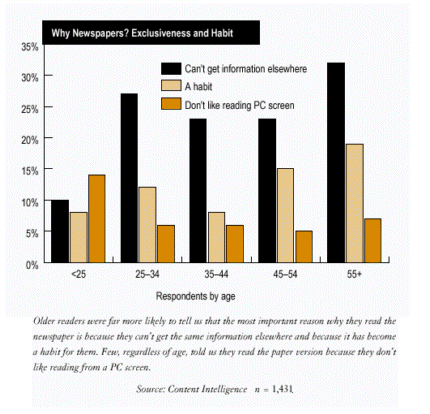With So Much Content on the Internet, Why Do People Still Read Newspapers?
by John McIntyre
Despite the availability of a rich digital environment, people are still buying and reading newspapers. Honing in on the reason why raises a key question: what is the most important reason why people read or subscribe to a newspaper?Two key responses emerged from our latest research. First, people enjoy the medium's portability because they can take it wherever they go, and second, they say the medium contains information they cannot get from another source-information we presume they must deem essential because they often devote precious time to retrieving it.
The portability factor is perhaps a surprise winner, but it is compelling when considered along with two other findings: 46 percent of our audience (more often the younger and less affluent) told us that their newspaper reading location habits varied daily, and those who expressed a preference for the portability factor also tended to be younger, less well educated, and less affluent.
To us, this begs a simple question: If portability and wherever/whenever usability are key factors in newspaper readership, especially among younger readers who are driven by a mobile and varied lifestyle, then what might be the outlook for newspapers if wireless, mobile reading devices or smart cell phones become commonplace?
Other responses that netted some notice were that newspapers contained better or more detailed information than they can get elsewhere, while some older readers said that newspaper reading had become a habit. A small percentage noted that they don't like reading from a PC screen, a sentiment that has led many to speculate that the Web will never replace paper (See chart, "Why Newspapers? Exclusiveness and Habit").
The fact that one-quarter of respondents cited the exclusiveness of the information offered by newspapers as their reason for reading or subscribing to them is interesting considering that our typical Web-enabled respondent: logs onto the Web multiple times daily; often stays online for 45 minutes or more; and has typically visited the website of the newspaper they read at least on an occasional basis.
We wondered why, when respondents are logged on daily, they don't get the essential information they need from the newspaper Web site and dispense with the dead-tree version altogether?
The cross-tab data shows that age and access frequency were factors in this puzzle. Those 55 years of age and older were most likely to think the newspaper had unique information they couldn't get elsewhere, along with, surprisingly, those who accessed the Internet most frequently (ten or more times daily). However, members of this last segment were also the least likely to say that newspaper reading had become a habit for them.
Older users said they looked in newspapers for community and regional general and business news and for obituaries. Those with very high Web access frequency (10 or more times per day) tend to prefer the Web as their source for all information. The fact that these respondents cite the exclusiveness of newspaper information means that respondents are turning to paper newspapers because they cannot get some types of information or content from the Web.
One disappointing sign for the newspaper industry is that only 4 percent of our audience said that they like reading the newspaper because they like the writing or news reporting style. For an industry that places considerable emphasis on journalistic awards and prides itself on the quality of its editorial work, especially compared with its electronic brethren, this rating has to rank as a major disappointment. More importantly, newspapers cannot count on the quality of their editorial work to retain readers because readers don't share the same perceptions about newspaper editorial quality.
Tip O'Neil Was Right: Everything Is Local
So what unique information do people get from a newspaper that they can't get elsewhere? The big winner was local and community news of differing varieties and utility data for housing and employment. A breakdown of the types of in formation respondents said they can get from a newspaper that they can't get elsewhere follows:
- 57 percent cited community or regional news, correlating dramatically with increasing age;
- 36 percent said community or regional business news, correlating with increasing age and with shorter length and lower frequency of Internet experience;
- 32 percent pointed to employment and job information, strongly correlating with lower income and younger age (especially under 25), but this response was also popular across most demographics;
- 29 percent listed community or regional sports, correlating with increasing age;
- 42 percent pointed to obituaries, strongly correlating with sex (female) and advancing age, while those who have more Internet experience or access the Internet more frequently and those with a better education gave this response less frequently;
- 24 percent cited education and school news, strongly correlating with sex (female) and age (under 25); and
- 22 percent said real estate information, correlating with sex (female) and younger age groups.
What's Not Exclusive?
When respondents were asked what content is in the newspaper that they can't get elsewhere, political news and commentary earned only a 16 percent response, indicating that this audience has found other sources for this information or does not want this information at all. While younger females with incomes under $25,000 and lower educational attainment were the most likely to avoid reading political news and commentary, the respondents most likely to read such news and commentary were males with graduate educations and annual incomes over $75,000. Political news and commentary has long been a bedrock readership area associated with newspapers, but now it appears that readers are either going elsewhere for their political news or don't want it at all.
In addition, our respondents said the following subjects areas (in ascending order, all single-digit responses) are not uniquely available in a newspaper:
family and parenting information;
national business news;
health and fitness information and environmental information (tie);
and personal finance and investment information; science and computer/technology news; and professional sports (tie).
The above subjects, staple content areas for most local and regional newspapers, are clearly information segments in which readers are not interested or for which they have found other (and perhaps, better) media sources, including the Internet. Our survey results, which agree with other industry surveys, suggest that local news will be the kingpin of future newspapers because it is their only truly unique feature. While all kinds of national and international news and sports, not to mention classifieds and real estate ads, are available from a multitude of Web sites and other media sources, for now no website can match the comprehensive local reporting capability of a newspaper-a capability that readers clearly want. At some point, perhaps Web-based alternatives to the local news resources of local newspapers may arise, but at a time when the financial industry has completely lost confidence in Web media, that short-term prospect seems very remote. While newspapers may be successful in capturing and maintaining their hold on the local news franchise if they work at it, their business model, highly dependent on local and classified advertising that may move to the Web, is far less certain to survive.

|
 **John McIntyre is the managing editor of
Content Intelligence, a new publication from
Lyra Research in Newtonville, Mass. Mr. McIntyre brings more than 25 years of high-tech industry
experience as a marketer, strategic analyst, journalist and author,
consultant, and market researcher. Most recently, he served as
Lyra’s Vice President of Marketing and Strategy, and previously,
Vice President of Custom Research. From 1995 to 1999, Mr.
McIntyre served as Managing Editor of an industry-leading
newsletter and also authored several industry reports. Prior to
joining Lyra, he served as Director of Printer Services at BIS
Strategic Decisions, and spent 16 years at NEC Technologies,
serving as Applications Engineer, Product Marketing Manager, and
Director of Marketing. Mr. Mc Intyre also held marketing positions
with Advanced Color Technology, Inc., and Xerox Corporation, and
technical positions with Raytheon Service Company and Di/An.
**John McIntyre is the managing editor of
Content Intelligence, a new publication from
Lyra Research in Newtonville, Mass. Mr. McIntyre brings more than 25 years of high-tech industry
experience as a marketer, strategic analyst, journalist and author,
consultant, and market researcher. Most recently, he served as
Lyra’s Vice President of Marketing and Strategy, and previously,
Vice President of Custom Research. From 1995 to 1999, Mr.
McIntyre served as Managing Editor of an industry-leading
newsletter and also authored several industry reports. Prior to
joining Lyra, he served as Director of Printer Services at BIS
Strategic Decisions, and spent 16 years at NEC Technologies,
serving as Applications Engineer, Product Marketing Manager, and
Director of Marketing. Mr. Mc Intyre also held marketing positions
with Advanced Color Technology, Inc., and Xerox Corporation, and
technical positions with Raytheon Service Company and Di/An.
Return to the August 2001 issue of The IWJ.
